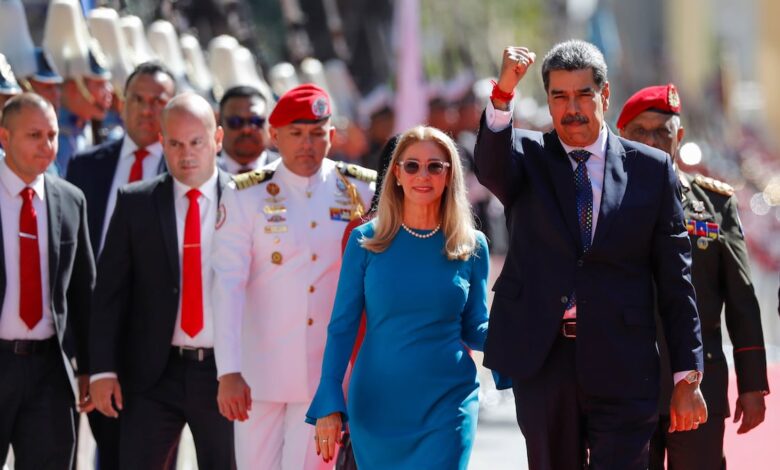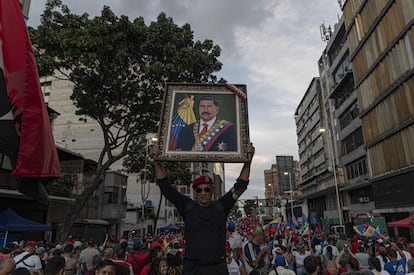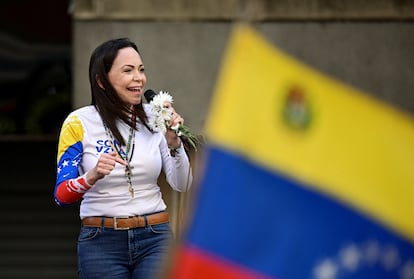
Nicolás Maduro was proclaimed president of Venezuela on Friday. He was sworn in before the president of the National Assembly, Jorge Rodriguez, who imposed the presidential sash on him. The Chavista leader returned to office without having shown the electoral records proving his victory, despite the fact that almost the entire international community has demanded it.
“They tried to turn the swearing-in (…) into a world war, they said that they would be coming into the country, going out… Say what you will, do what you want, but this Venezuelan constitutional inauguration could not be prevented and it is a great Venezuelan victory,” said Maduro in his speech, which lasted a little less than two hours.
Following the proclamation, the United States raised to $25 million, the maximum available amount, the reward for information leading to Maduro’s arrest. The European Union, for its part, condemned him for lacking “democratic legitimacy” and redoubled its sanctions.
The focus also remains on Edmundo Gonzalez Urrutia, the opposition candidate who, according to the verification of the tallies by international organizations, was the winner of the July presidential elections. Edmundo Gonzalez is in the Dominican Republic, where yesterday he participated in several acts to denounce Maduro’s fraud. The opposition had reiterated on several occasions that he would be in Venezuela on January 10. Paranoia over a potential invasion had intensified within the government’s top leadership, which had militarized of the country.
Opposition leader María Corina Machado resurfaced on Friday with a message published on Instagram where she underlines the historical importance of the mobilizations against the inauguration of Nicolás Maduro, whom she accuses of carrying out “a coup d’état,” and announces that Edmundo González will return to Venezuela “when the conditions are right.” “It is time to do whatever is necessary to restore the Constitution”, said the veteran opponent, arrested by the regime on Thursday and later released.
The 72 hours leading up to the inauguration were terrifying. Maduro’s police arrested activists, opposition figures, and journalists. Plainclothes officers detained Edmundo González’s son-in-law on Tuesday as he was taking his children to school, who were shocked by the scene. The following day, they arrested Carlos Correa, a defender of freedom of expression, whose whereabouts remain unknown. Nearly simultaneously, they arrested Enrique Márquez, an opposition presidential candidate with a more conciliatory approach, who ran on a separate ticket to the Machado and Edmundo movement. However, after the elections, he relentlessly demanded the electoral records and refused to recognize Maduro’s victory.
There has been speculation within the opposition about Edmundo González’s next moves. When he went into exile in Spain at the beginning of September, many believed he had distanced himself from the political struggle after signing a document presented to him by Maduro’s two main political operatives, Delcy and Jorge Rodríguez. The document indirectly acknowledged the Chavista victory. Machado’s team viewed this signature as a major blow to their cause. However, Edmundo quickly retracted his statement, claiming he had been coerced. Shortly thereafter, he declared that he would be in Caracas on January 10. Those around him say they could see the determination in his eyes.

Edmundo González remained in the Dominican Republic on Thursday night, exhausted from a week-long tour throughout the Americas. The intelligence services in the Dominican Republic have established a tight surveillance network around him and his wife, Mercedes López. There was speculation within the opposition that he might symbolically claim Venezuelan territory, either in its waters or within a consular space. However, those close to him maintain that he is determined to enter Venezuela by any means necessary. Once there, he could attempt to seek refuge in an embassy, though this would not be easy. Alternatively, they say he is more inclined to allow himself to be arrested by Chavista authorities. At 75 years old, and with the law on his side, he should be placed under house arrest rather than imprisoned.
The international delegates who came for Friday’s inauguration were greeted by a dramatic display of Nicolás Maduro’s face in the sky, created by drones flown from the La Carlota base. The spectacle was visible from every corner of Caracas. Brazil, Mexico, and Colombia, the countries that unsuccessfully attempted to mediate in the post-election conflict, are expected to send their ambassadors, barring any last-minute changes, despite not officially recognizing the Chavista victory. Chinese President Xi Jinping has sent a representative, while Russian President Vladimir Putin announced that the President of the State Duma, Vacheslav Volodin, will represent Russia. Bolivian Foreign Minister Celinda Sosa is also expected to attend.
The event was preceded by a day of clashes in the streets between Chavistas and the opposition. The former had the full weight of the state apparatus at their disposal to obstruct the latter in Caracas. Machado had called on her supporters to gather in an effort to prevent Maduro’s investiture and secure Edmundo González’s. After four months in hiding due to government persecution, she reappeared in the financial district of Chacao, where she was met by a crowd. Following a speech in which she urged her followers not to be afraid, she left the event on a motorcycle. According to witnesses and members of her team, she was stopped by the police on the way. For half an hour, her whereabouts were unknown.

The news of her arrest quickly spread around the world. At one point, her team announced her release. High-ranking Chavistas denied she had been detained, with one of them telling EL PAÍS: “She’s the one who dreamed we’d catch her and turn her into Joan of Arc. We’re not going to give her that pleasure.” Prosecutor Tarek William Saab then released a statement full of insults against her. Donald Trump, the president-elect of the United States, came to her and Edmundo’s defense on social media: “These freedom fighters should not be harmed and must stay safe and alive.”
Sign up for our weekly newsletter to get more English-language news coverage from EL PAÍS USA Edition